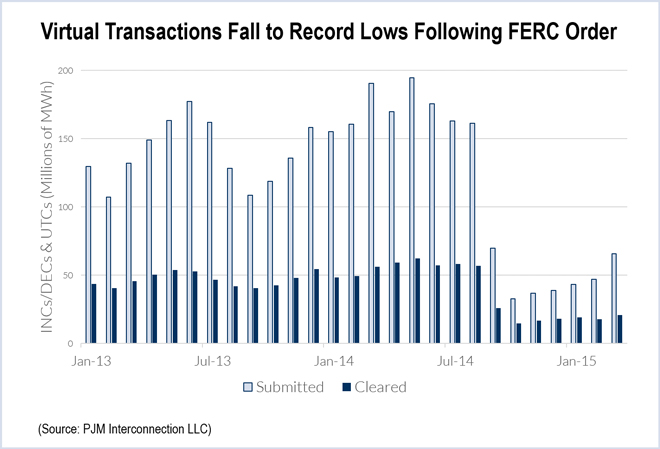By Rich Heidorn Jr.
A proposal to impose a temporary $0.07/MWh uplift charge on all netted virtual transactions received a cool response from PJM members Thursday — including a rebuff from the attorney for the Financial Marketers Coalition.
Noha Sidhom of Inertia Power proposed the charge as an interim response until the Federal Energy Regulatory Commission rules in the Section 206 proceeding it ordered in September to determine whether PJM is improperly treating up-to-congestion bids (UTCs) differently than increment offers (INCs) and decrement bids (DECs).
While INCs and DECs are charged uplift and subject to the financial-transmission-rights forfeiture rule, UTCs are exempt from both.
UTC trading volumes crashed after Sept. 8, the refund effective date set by FERC for any uplift assessments.
PJM reported last week that trading volumes for INCs, DECs and UTCs remained near the lowest levels ever, despite modest monthly increases over the last six months. Cleared UTC transactions were at less than one-third of their level in August, before the FERC order. Submitted UTC transactions have rebounded to 40% of the August level.
Reducing Uncertainty
Sidhom said the interim fixed fee could reduce uncertainty for virtual traders, encouraging them to increase trading volumes for the summer. She introduced a problem statement to consider the fee at Thursday’s Markets and Reliability Committee meeting.
The commission said it expected to rule in the 206 docket (EL14-37) within five months after it receives comments following a technical conference. But more than three months after the Jan. 7 conference, the commission has yet to issue a request for those comments. William Sauer, the Office of Energy Policy and Innovation staffer who chaired the conference, has since joined the staff of Commissioner Colette Honorable as a policy adviser. (See Stakeholder Process Under Attack at FERC Hearing on PJM Financial Trades.)
The proposal would apply the seven-cent fee to each UTC trade and to netted INCs/DECs — involving the same volume and same hour but different locations — with both the INC and DEC assessed the full fee. Un-netted INCs and DECs would continue to pay under current uplift rules.
Sidhom said the interim fixed fee would be a trial, allowing market participants and PJM “to see what virtual volumes will look like at a certain fee level,” information that could help determine an appropriate fee for the future.
The Energy Market Uplift Senior Task Force is considering nine proposals, three of which — an American Electric Power proposal and two PJM proposals — were selected by stakeholders for backcast analyses by PJM. Results of the analyses are scheduled to be discussed at the task force’s June 3rd meeting.
Sidhom said her proposal recognizes that there isn’t enough time to reach agreement on a long-term solution before the more volatile summer months. She said there is uncertainty regarding whether the task force will reach consensus and if any solution stakeholders agree on will win FERC approval. The task force is unlikely to send a proposal to the MRC before July or August, she said.
Sidhom said more trading volume would improve convergence between the day-ahead and real-time markets and result in better price formation and forecasting of congestion.
Market Monitor Joe Bowring repeated his long-standing position that there is no evidence that UTCs improve price convergence. Bowring also said the fees on virtual transactions should vary with the level of uplift.
‘Pretty Big Discount’
Susan Bruce, representing the PJM Industrial Customers Coalition, said seven cents “seems to be a pretty big discount,” noting that the average deviation rate is $2.10/MWh.
Sidhom said that the average deviation rate for the 12 months ending March 31 was actually $0.84/MWh. She said adding UTCs to the trades sharing in uplift would reduce the rate for other market participants.
“We saw [seven cents] as a good starting point,” Sidhom said. She said she was “not wedded to” the seven-cent fee but added, “If we start at a really high rate we’re back to the status quo.”
The AEP package proposes a $0.15/MWh fee for each cleared pair of UTCs.
Jim Benchek of FirstEnergy said the interim proposal “seems like an end run around” the task force. “EMUSTF has been working on this for quite a while,” he said. “I’m not sure the timing on this is quite right.”
Sidhom said it was “very optimistic to think the task force will vote next month.”
Ruta Skucas, attorney for the Financial Marketers Coalition, said she was surprised to see the issue brought to the MRC. “We firmly believe it belongs in the EMU,” she said, using the shorthand name for the task force. She said afterward that the coalition is working on a similar proposal to be considered through the task force.
Sidhom, whose company is not a member of the coalition, said she was not trying to bypass the task force but seeking an interim fix for the summer while the panel completes its work on the issue.
Dominion Resource’s Louis Slade said the proposal was premature given that PJM is conducting the backcast analysis on AEP’s fixed fee proposal.
Only one other stakeholder, Stephanie Staska of Twin Cities Power, spoke in support of Sidhom’s proposal, asking how the market would react if FERC orders UTC traders to pay fees retroactive to September. “Every day that we’re not charging something is a day that liability grows larger,” she said.
In an interview after the meeting, Sidhom echoed that message, saying she was concerned that retroactive uplift charges could lead to defaults.




